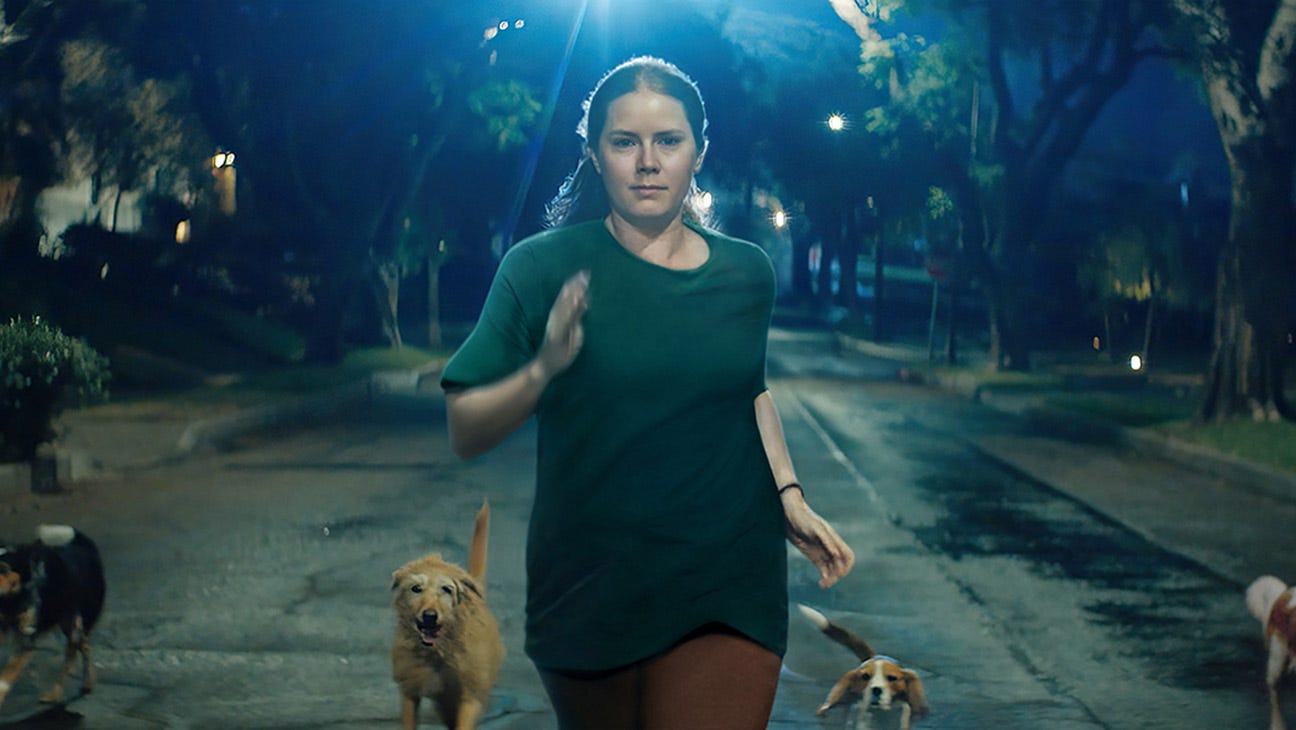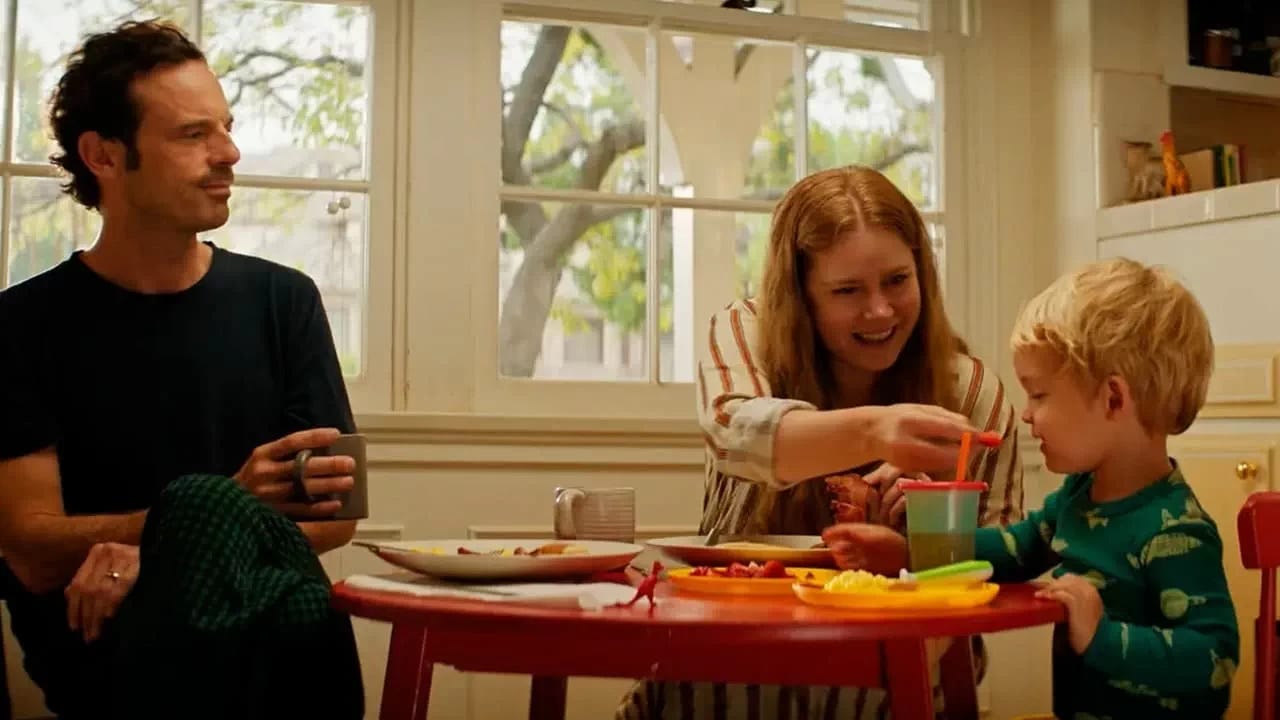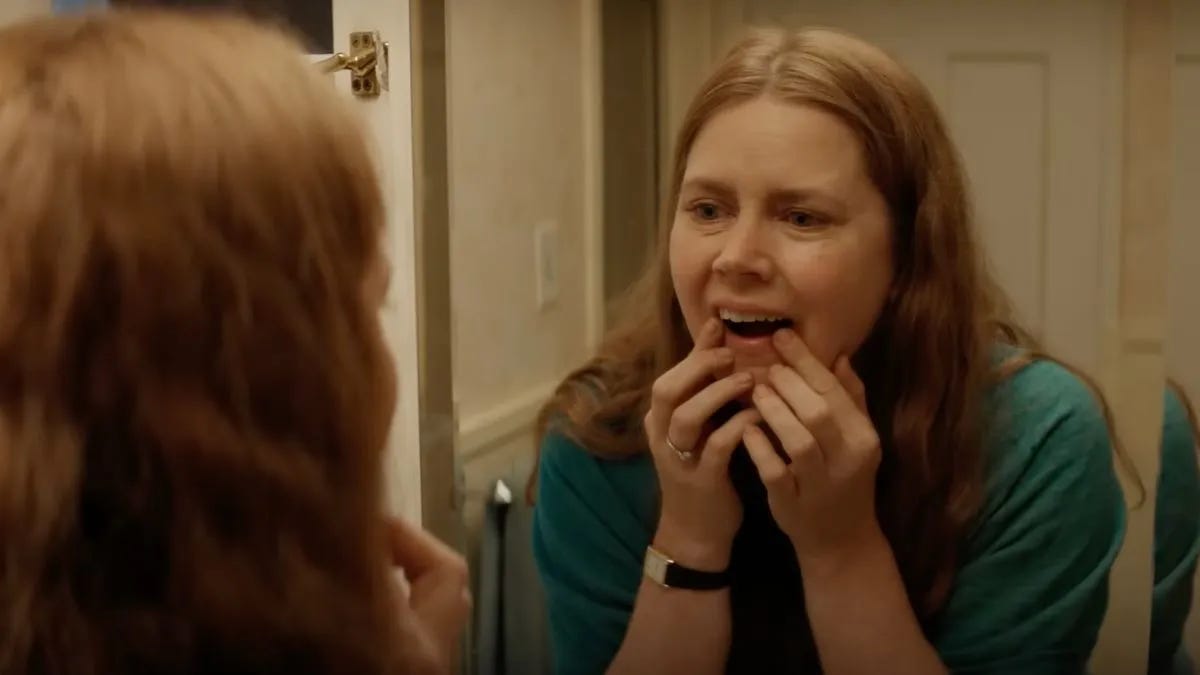'Nightbitch' review: Call of the wild
Amy Adams thinks she's turning into a dog in Marielle Heller's feral portrait of motherhood
There are a few points in Marielle Heller’s Nightbitch where I thought “This would have absolutely killed in 2015.”
Heller’s script, based on a 2021 novel by Rachel Yoder, traffics in the kind of unincumbered snark and bumper sticker feminism that feels just a few years past its prime. Whether you find that endearing or annoying is entirely a matter of taste.
I, for one, enjoyed it but found myself wanting something a little bit more raw.
A script is only a jumping off point for a good director, though, and Heller is a very good director. Across her four features (I’m not including her 2020 live recording of the Broadway play What the Constitution Means to Me), she has focused on characters either invisible, illusive, or both.
The worlds she creates are tied to people rather than expectation. Her portrait of ‘90s New York City in Can You Ever Forgive Me? was as varnished and world-weary as Melissa McCarthy’s downtrodden writer.
Speaking of McCarthy, Heller also has a knack for getting great performances out of her actors. Nightbitch is no exception. More than anything, this is a movie that hinges on a very specific face.
That’s because Heller knows that Amy Adams tends to engulf any movie she’s in. She taps into very specfic, sometimes extreme emotional registers with a subtlety that is flooring. I’m thinking of Arrival, where she finds approximately 300 different ways to silently convey grief, or Enchanted, in which her total commitment to playing an animated princess in the real world established her as a bonafide star.
In Nightbitch, Amy Adams is Mother. I say this as both a gay fan expressing admiration and as someone who is simply stating her character’s name as listed in the credits.
Mother is overwhelmed; she left her promising career as an artist to be a stay-at-home mom. Two or so years into this role, she recognizes that she has “become the housewife that she never wanted to be.” She has had to stifle a vital part of herself to make being a full-time parent work.
The confines of suburbia are comfortable but bland, her old bohemian existence and repressed creativity constantly nag at her.
For the first 20 or so minutes of Nightbitch, we see the everyday monotony of Mother’s routine. She cooks frozen hashbrowns for breakfast, does the dishes, takes her son to the park. Then her husband (Scoot McNairy) shows up. His job takes him away from the family for four days a week; he has privacy and gets uninterrupted sleep.
You would think that his arrival meant that Mother could go off duty for a bit. But there’s a reason that McNairy’s character is listed simply as Husband and not Husband/Father. Even when it’s his turn to give the kid a bath, he has questions, or needs help.
And by needs help, I mean he doesn’t want to do things himself. In one pointed if cliche moment, Adams finds him on the toilet zoned out on his phone after interrupting her much-needed break on the couch by asking her to grab a bath towel for their son.
“You know, I do this by myself every night,” she says pointedly, chucking it at him.
Throughout the movie, Adams takes lines like this and finds a level of verbal or gestural fury that is just a bit more than expected. There are many shots of her face crumpling into exhaustion, of her eyes darting anxiously around a room even as she tries to relax.
Adams taps into the righteous anger pulsating through this character, something that begins to manifest physically. One day, while playing pony with her son, he notices something. “Fur!” he shouts.
Mother goes to the bathroom and discovers a patch of white hair on her lower back. She starts to notice other unsightly hairs, too. And are her teeth getting sharper, too?
She chalks it up to stress at first, but then her craving for red meat reaches a fever pitch and she feels the need to leave her house at night to run around in the dirt.
Oh, and she also pops a absess on her back and discovers a tail.
Has parenting pushed her past the point of sanity, or is she really turning into a dog? Is the group of strays that start following her around- beckoning her to come play or kill smaller varmin- really there? Are they moms, too?
Nightbitch is both an ode to and a satire of motherhood. It’s a movie about the primal urge for self-actualization bursting to the surface, past all those sleepless nights, pithy singalongs, and obtuse husbands.
Heller and Adams look the well-worn “Women can have it all!” axiom dead in the eye and ask “At what cost? No, really, at what cost?” It works because they walk a very tricky tonal line that infuses the character’s caustic wit with genuine warmth and affection.
This is not an easy balance to achieve. Heller does it by making us constantly quesiton the movie’s reality.
Mother’s interior monologue often manifests itself in scenes of fantasy or flashback; she imagines pouncing on her husband and tearing him apart, she looks back on her deeply religious childhood and finally understands her own mother’s feral discontent. But there are times where Heller doesn’t make it clear whether things are in Mother’s head, as in one shocking outburst during a solo outing with her former art colleagues.
Heller’s freewheeling direction and Adams’ portrait of a calm-yet-seething woman on the verge elevate the movie past its script’s shortcomings. Nightbitch is a war between sarcasm and sincerety, and it knows that there can be no winner.
Nightbitch screened at the 43rd Vancouver International Film Festival. It opens in theaters on Dec. 6, 2024.





